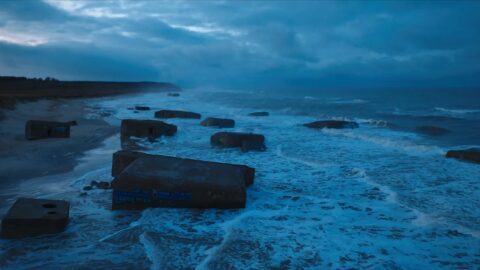Following a spate of formally slippery films, The Light (Alexander Lind, 2023) is easily the most conventional film I’ve seen in Rotterdam this year. That’s not necessarily a slight against Alexander Lind’s economically paced documentary, which packages plenty of intriguing information into a fleet history lesson on a Danish art installation and its inadvertent revelation of staunchly fervent nationalism.
The piece in question was a laser show mounted by Elle-Mie Ejdrup to commemorate the 50th anniversary of Denmark’s liberation from Nazi Germany’s occupation. Charting a course from Sild to Skagen, the laser illumined a series of bunkers constructed by Danish labourers for the Nazis. The project drew vociferous condemnation from former members of the Danish resistance for the incendiary implication of collaborationism the bunkers effectively symbolise.
The ensuing media circus leading up to the laser’s projection spurred accusations of fascist sympathies against Ejdrup and no paucity of harassment which effectively curtailed her career. Lind largely relies on a balance of talking head interviews and archival footage to recount the personal and professional fallout Ejdrup and her colleagues faced. Indeed, The Light packs a lot of information concerning Danish cultural norms and traditions into less than 70 minutes, which consequently has little breathing room while Lind favours needlessly florid aesthetic gestures, including a subterranean set where Ejdrup confronts stand-ins for Danish patriarchal authority.
Ejdrup’s motivation in the project, informed by her terminal cancer prognosis, is the clearest thread governing The Light. Her attempt to take ownership over the scars left from chemotherapy by emphasising the lingering scars of her country’s history is mined for plenty of irony. The shame she’s carried from the experience makes The Light tragically poignant. Ultimately, the film’s allegorical treatment of illumination as an artistic gesture risks pat truism, yet it’s not without provocative truth.
Nick Kouhi is a programmer and critic based in Minneapolis, Minnesota





